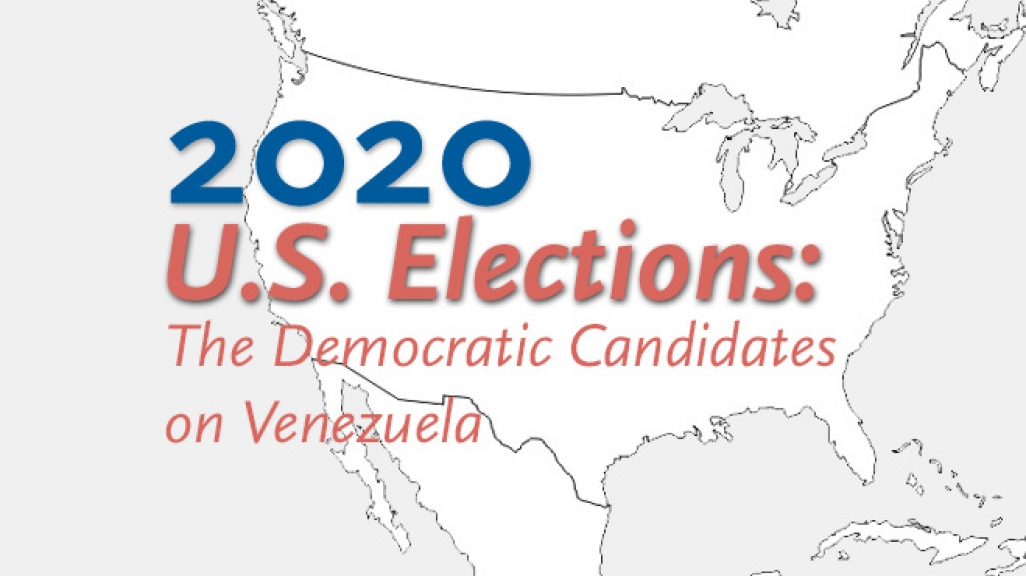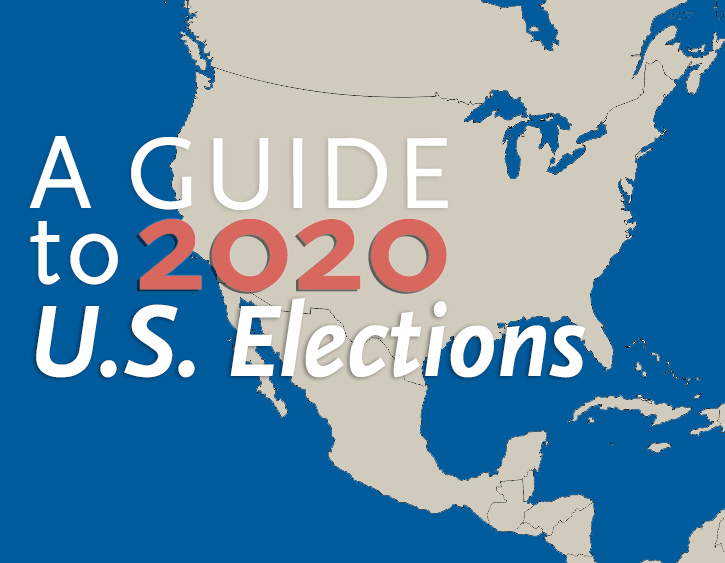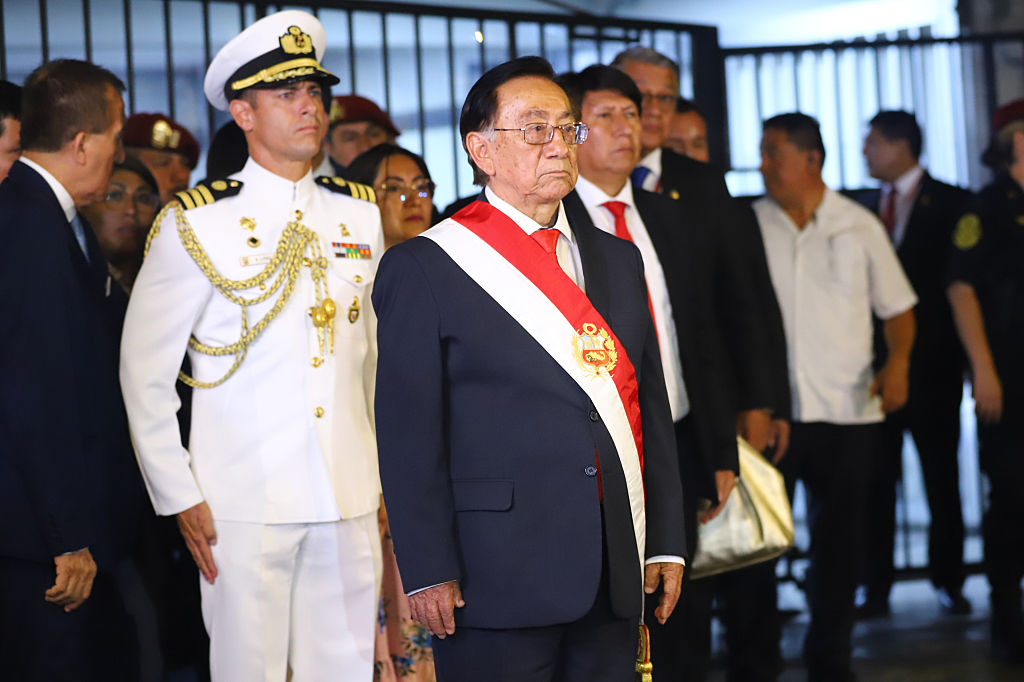U.S. 2020: The Democratic Candidates on Venezuela
U.S. 2020: The Democratic Candidates on Venezuela
With Donald Trump using Venezuela as a wedge in Florida, it matters where the Democratic hopefuls stood on the issue.
At his third State of the Union address on February 4, one of U.S. President Donald Trump’s guests of honor was none other than Juan Guaidó. The 36-year-old, now in his second year as interim president of Venezuela, received a bipartisan standing ovation from the U.S. Congress—one of the only moments of unity during the event and an iconic capstone to his worldwide diplomatic tour. The following day, Trump received Guaidó at the White House, but cancelled a scheduled joint press briefing that would have happened in the middle of the Senate vote on articles of impeachment against the U.S. president. Before that, Guaidó met with Vice President Mike Pence and Florida Senators Marco Rubio and Rick Scott.
Trump knows Florida is key for him to win in November, and he kicked off his 2020 reelection campaign with a rally in Orlando. Few issues are better to galvanize Florida’s substantial Latino population than Venezuela. As one Republican strategist told The New Yorker’s Jonathan Blitzer, “If you solve the Venezuela problem, you get three for the price of one…You’ll make the Colombians, Nicaraguans, and Cubans in Florida very happy.”
With that in mind, where the Democratic presidential hopefuls, and the eventual nominee, stood on their policy and positions toward Caracas is no fringe issue if they want to win Florida on the road to taking back the White House. U.S. policy toward Venezuela—especially opposition to Nicolás Maduro and support of Guaidó—is one of the few policy areas with support on both sides of the aisles in Congress, especially among the Florida caucus.
- See candidate positions on other topics: climate change, immigration, security, trade.
- This article was originally published on February 6, 2020.
- Lea este artículo en español.
- The former vice president and longtime Delaware senator pledges to extend Temporary Protected Status, or TPS, to Venezuelans who’ve fled the humanitarian crisis, which he says is “brought on by the Maduro regime.”
- He supports “stronger multilateral sanctions” against individual chavista operatives who are stashing assets in Europe, Latin America, and the United States.
- Biden called for support of Guaidó on February 9, 2019, two weeks after the latter assumed the interim presidency of Venezuela.
- He calls Maduro a “tyrant” and recognizes that the de facto president uses dialogue as a stalling tactic. Biden has called on Maduro to step down and allow for a democratic transition via elections.
The violence in Venezuela today against peaceful protesters is criminal. Maduro's regime is responsible for incredible suffering. The U.S. must stand with the National Assembly & Guaidó in their efforts to restore democracy through legitimate, internationally monitored elections.
— Joe Biden (Text Join to 30330) (@JoeBiden) April 30, 2019
These are positions of candidates who have dropped out of the race since this article was first published:
Michael Bennet
- The Colorado senator cosponsored the bipartisan Venezuela Emergency Relief, Democracy Assistance, and Development (VERDAD) Act of 2019.
- He also signed both the March and June of 2019 letters on TPS.
- He supports internationally coordinated sanctions against the country.
- Bennet said in May 2018 that the elections awarding Maduro a second term were “neither free nor fair” and he calls the Maduro administration an “illegitimate regime.”
- The billionaire businessman says the United States should remain “steadfast” in its support of Guaidó and that Washington can support free and fair elections “once” the Maduro administration ends while supporting humanitarian efforts for Venezuelan migrants in the meantime.
- His campaign site says he will “order an immediate review” of TPS for Venezuelans.
- “Under the regime of Nicolás Maduro, Venezuela has become a case study in how despotism can lead a country to ruin—and destabilize an entire region in the process,” writes (in both English and Spanish) the former New York City mayor, who’s spent much of early 2020 in Florida.
Una multitud de simpatizantes reunida este fin de semana en Miami en apoyo a Juan Guaidó, líder legítimo de Venezuela, dejó claro que el pueblo venezolano no está solo. Cuando caiga Maduro, apoyaremos sus esfuerzos por reconstruir una Venezuela libre, próspera y democrática.
— Mike Bloomberg (@MikeBloomberg) February 3, 2020
Pete Buttigieg
- The former mayor of South Bend, Indiana, advocates for working with regional partners to attend to Venezuelan migrants and refugees, and for extending TPS to Venezuelans in the United States.
- He sees Venezuela as an example of the need to set a standard for the use of military force. He says he does not see committing U.S. military force to Venezuela as appropriate since there are no “core” U.S. interests at stake.
- Buttigieg says he recognizes Guaidó as “the rightful interim president” and calls Maduro a “dictator.”
Venezuela needs free and fair elections, not a unilateral US military intervention with no game plan or exit strategy. Our troops deserve a president who will set a high and clear standard for the use of military force. https://t.co/PWxbB5NhCp
— Pete Buttigieg (@PeteButtigieg) May 2, 2019
Tulsi Gabbard
- The Hawaii representative cosponsored bipartisan February 2019 legislation in the U.S. House that would prohibit military intervention in Venezuela without congressional approval.
- She voted in favor of legislation, which passed the House in July of that year, to extend TPS to Venezuelans.
- Gabbard mentions Venezuela regularly, typically alongside Iran, including in close to two dozen in Tweets, some of which date back to 2017. The bulk of her statements voice her opposition to any type of military intervention, which she frames as a policy agenda of regime change from neoconservative officials like John Bolton and Elliot Abrams. Incidentally, her statements don’t mention Hugo Chávez, Guaidó, or Maduro.
The root cause of mass immigration on our southern border is our history of US military intervention in Latin America that left countries destroyed. Before we talk about a wall, we need to end our ongoing threats of intervention - this time in Venezuela. #SOTU
— Tulsi Gabbard (@TulsiGabbard) February 6, 2019
Amy Klobuchar
- She signed letters in March and June of 2019 urging Trump to extend TPS to Venezuelans.
- During a Florida stop in April of 2019, she said she supported sanctions, though it’s unclear if she was referring to broad economic sanctions against Venezuela’s oil industry or the individual sanctions on chavista officials.
- She’s made few comments on Maduro, except to tell the HuffPost in an email that she supported the Venezuelan people “standing up against” him.
- Klobuchar did not mention Venezuela (or any Latin American country) in remarks delivered to the Council on Foreign Relations (CFR) in December 2019.
Deval Patrick
- One of the few candidates to address Venezuela in his official platform, the former Massachusetts governor says he would go the diplomatic route, including building a regional coalition that includes Cuba to see democratic elections in the country.
- He told CFR that his administration would continue to recognize the Guaidó interim presidency.
- He says he would “step up” humanitarian aid as well as individual sanctions against chavistas.
- Not only would he “immediately” grant TPS to Venezuelans, but he says he would work to “resolve the permanent status of such refugees” through comprehensive immigration reform.
Bernie Sanders
- The Vermont senator is a cosponsor of a Senate resolution that would prohibit the funding of any military operations in Venezuela without express congressional approval. He has said that a hypothetical U.S. military intervention in the country would be “disastrous.”
- He co
-signed the June letter on TPS. - He does not support broad economic sanctions and his administration “would not be in the business of regime change” and calls for negotiations with the Maduro government and free and fair elections.
- Sanders has one of the more complicated stances on Venezuela, for which he’s been critiqued from both the right and the left. The senator indeed seemed amenable to chavismo’s model of state largesse at one time and has twice declined to call Maduro a dictator when questioned by journalist Jorge Ramos during his current campaign. In a February 22, 2019, interview with the Univision anchor, Sanders said he did not consider Guaidó to be the legitimate president of Venezuela.
- That said, the senator takes pains to distinguish his democratic socialist ideology from what he sees as authoritarian communism in Venezuela, whose economy he labels “a disaster.” He calls comparisons between the two models to be “nonsense” and “extremely unfair,” likening his vision to the example of Canada and the Scandinavian countries instead. In a September 2019 Democratic debate, he said that “anybody that does what Maduro does is a vicious tyrant.” and he’s repeatedly criticized Maduro for his “violent crackdown” against civil society.
- In the 2016 election cycle, a campaign email in Sanders’ name alluded to Chávez as a “dead communist dictator.”
The people of Venezuela are enduring a serious humanitarian crisis. The Maduro government must put the needs of its people first, allow humanitarian aid into the country, and refrain from violence against protesters.
— Bernie Sanders (@SenSanders) February 23, 2019
Tom Steyer
- The billionaire hedge fund manager and philanthropist has said little on Venezuela, except to mention it alongside North Korea, China, Russia, and the Arctic as examples of how U.S. foreign policy is “being ruined” by Trump.
.@realdonaldtrump's presidency is a disaster. Countries all over the world are calling his pathetic bluffs. Iran, North Korea, Venezuela, and now China in the space of a week. After 10,000 lies, guess what? No one believes you.
— Tom Steyer (@TomSteyer) May 14, 2019
Elizabeth Warren
- In an interview on the Pod Save America podcast in late February 2019, Warren said she supports the recognition of Guaidó by Washington, adding that working with our allies on Venezuela “increases the pressure on Maduro…and it undercuts any notion that the United States is bigfooting around South America.”
- The senator from Massachusetts also said in that interview she supports broad economic sanctions against the country with the caveat that they be coupled with humanitarian aid for migrants in neighboring countries.
- She supports granting TPS for Venezuelans in the United States.
- She is a cosponsor of the Senate resolution on military action in Venezuela along with Sanders and has said, “There is no U.S. military option in Venezuela. Congress has not authorized it, the neighboring countries don’t want it, and it won’t solve the problem.”
- Warren, who refers to Maduro as “a dictator and a crook,” singled out China, Cuba, and Russia for their support of Maduro and says that Washington “must contain [those countries] damaging and destabilizing actions” if they continue to back him.
Venezuelans are fleeing persecution only to wind up detained under Trump's cruel immigration policies.
My administration will not turn its back on those seeking freedom from violent dictatorships. Venezuelan asylum-seekers deserve parole and TPS now. https://t.co/1gnrJ8lRJu
— Elizabeth Warren (@ewarren) December 9, 2019
Andrew Yang
- The tech entrepreneur says that as the U.S. commander in chief, he would continue to recognize Guaidó as interim president of Venezuela and does not support military intervention in the country.
- He supports individual sanctions against Maduro officials, but also adds that he would “consider amnesty” for Maduro loyalists who defect to support Guaidó.
- Yang sent a series of Tweets in February 2019 referring to the country as “on the verge of becoming a failed state” due to “failed leadership.” He also said at that time that, “The U.S. shouldn’t be in the business of regime change.”
Venezuela is on the verge of becoming a failed state. Sanctions - which would hurt the people- aren’t helpful nor is talk of military intervention. The goal should be free and fair elections and Venezuelan self-determination. The US should not be in the business of regime change.
— Andrew Yang (@AndrewYang) February 2, 2019









